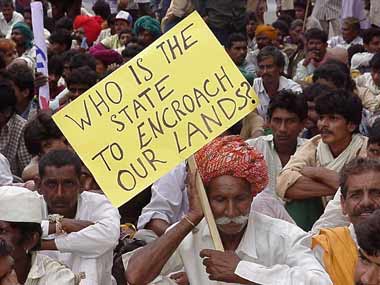What is the true cost of doing business in India? The opponents of the Land Acquisition Bill, passed by Lok Sabha on Thursday, say the bill will inflate those costs and hold back economic growth. The Congress says the bill levels the playing field between the poor farmer and big corporations, and forces industry to accept environmental and social costs of business, which it otherwise would neglect. And then there are those who say the bill does not go far enough in protecting the interests of the poor, such as Aam Aadmi Party member and political scientist Yogendra Yadav.  The bill was debated on CNN-IBN’s India at 9 panel discussion. Naresh Gujral, the Shiromani Akali Dal MP from Punjab, and journalists Swapan Dasgupta and Sunil Jain were adamant that the bill was bad economics, while Yadav felt the business lobby had watered down the bill so it did not go far enough. That left Rajeev Gowda, Congress MP and professor at IIM to defend the bill’s merits. Gowda defended the timing of the bill, and the Food Security Bill, which he said were not born overnight and had been worked upon for many months. “They are not aimed at the elections,” he said. “They are aimed that the economics of India’s development is correct.” The merit of the Land Acquisition Bill is that it creates a predictable framework within which companies can acquire land and also takes in account environmental and social factors, thereby creating a more realistic value of business costs. “[There is] nothing wrong with development,” he said. “We are eager for more of it.” Though Gujral’s party would vote for the bill later the same evening, he called it “Machiavellian” and said it was anti-youth and would “finish the creation of jobs in this country.” The reason being that at the land prices stipulated in the bill, industry, which is motivated by profit, would in effect be priced out of business. “No transaction will take place so the farmer will also not benefit, ” he said. Dasgupta concurred with Gujral, saying that the bill makes economic development, particularly industrialisation, almost impossible. “It is not economics. It is the approach of a person who has never worked in her life.” Yadav, though, felt the debate was missing a crucial voice – that of the farmer or adivasi. He pointed that the bill was necessary to replace a 120-year-old colonial act “which is draconian and is a black spot on India’s conscience”. Yet this bill did not go far enough in doing justice to the expectation of farmers because industry had convinced the government otherwise. “To my mind, this is an abysmal failure,” he said . For Sunil Jain, a columnist for the Financial Express, the mandated increases in land prices could have been managed. “The killer is you have to have a rehabilitation scheme for everyone. If you are paying four times the market place, that person has to rehabilitate himself.” Citing the bill’s complicated procedures for acquiring land, Jain said, even the government would struggle to buy land to build a godown that could store grain to meet the Food Security Scheme. Yadav jumped in to refute the language of the debate, saying the Land Acquisition Bill was not about subsidies. It was about the compulsory acquisition of land using the principle of eminent domain. In that context, it was necessary for the interest of the weaker sections of society to be protected, especially since the registered market price of land was always lower than the actual price because payment for land is often under the table. Gujral was still skeptical that government intervention in a market transaction was necessary. If the Tatas, for example, wanted to buy land in Punjab and farmers agreed to sell, he wanted to know why the state needed to intervene. Dasgupta pointed out that in any case, state intervention wasn’t always for the better. “Does Mr Bhupinder Singh Hooda’s intervention create a level playing field or is it the perpetuation of crony capitalism?” Jain felt that industrialisation was the only way to lift people out of poverty and to promote industry, you need land, he said. As for the political consequences of the bill, it might lead to a short-term boost for Sonia Gandhi and the Congress, Yadav said. But the UPA government’s credibility was far too damaged for the bill to bolster the government’s election prospects. The real disgrace though, was that there was not “one serious voice to stand for the farmer, for rural India and that is an indictment of our democracy”.
The UPA government’s credibility was far too damaged for the land bill to bolster the government’s election prospects, said Yogendra Yadav.
Advertisement
End of Article


)
)
)
)
)
)
)
)
)



